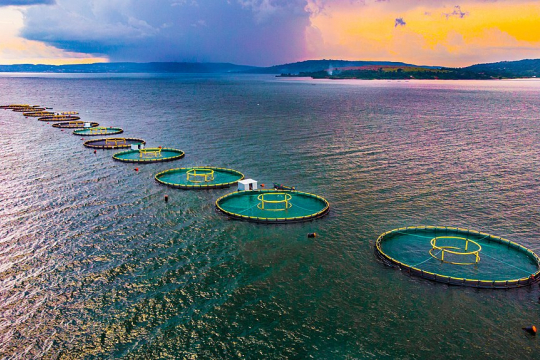Researchers from EfD Vietnam and Uganda will analyze how fish farmers in those countries perceive risks, in particular climate-related risks, and how they adapt to those risks since they are significant for fish farming in both countries.
Aquaculture, also known as cage fish farming, is a more attractive economic activity for rural households than fish capture in Vietnam and Uganda. Over-exploitation of the fish stock and the consequent stagnation of fish decreases the economic yield and make it hard to meet the population’s demand for fish. Cage fish farming may meet this demand; however, these farmers encounter many challenges and risks related to high production costs, diseases, strict quality regulations, and climate-related risks. The latter has been less studied than the other risks.
Climate change may impact fish survival, growth, and mortality. It can also affect the sustainability and fish production through rising temperatures, ocean acidification, diseases, harmful algal bloom, and changes in rainfall. The impacts of these aspects are not the same on every cage fish farm, since every farm has specific characteristics such as location and size (1).
The title of the research, financed by EfD, is Climate-related Risks and Sustainable Cage Fish Farming in Vietnam and Uganda.
Methods to analyze risks
This research will be carried out by Hoa Le Dang (EfD Vietnam and WinEED), Aisha Nanyiti (EfD Uganda), Nam Khanh Pham (EfD Vietnam and BlueRForD), and Thuyen Thi Pham.
“It represents a great opportunity for African and Asian researchers to work together on a topic of mutual interest and concern”, says Hoa Le Dang.
The researchers are interested in understanding how cage fish farmers perceive risks. Therefore, they plan to conduct surveys at selected landing sides on Victoria Lake, Uganda, and some provinces in the Mekong Delta, Vietnam. The farmers will rate different risk factors such as market, production, finance, water pollution, among others, and their impacts on their fish production.
Then, to deepen the understanding of the cage fish farmers’ perception of risks, risk preference and factors affecting farmers’ choice of adaptation measures to climate-related risks, they will use experiments and econometric models. They will use variables such as farm characteristics, demographic factors, farmers’ experience in aquaculture, technical support and consultancy, risk preferences, and risk perceptions.
Results can give input to policy-making
The researchers will collect the data using secondary sources and do surveys and interviews with fish farmers and local authorities in both countries. They are interested in involving different stakeholders in the project such as officers from agricultural and development institutions, besides fish farmers. They also expect that this research will contribute to the development of the aquaculture sector in both countries and give insights into how women fish farmers perceive risks differently than men fish farmers. This project will last approximately two years, then, at the end of 2025 or the beginning of 2026, the researchers will share their results.
“From the theoretical perspective, this research will offer a comparative study of cage fish farmers’ perception and adaptation to climate-related risks in Vietnam and Uganda. From the policy practice perspective, the results will offer policy recommendations for local authorities to support cage fish farmers adaptation to climate-related risks while improving their livelihoods and sustainability of the activity,” says Hoa Le Dang.
(1)This information comes from this article from Journal Frontiers: https://www.frontiersin.org/articles/10.3389/fsufs.2021.609097/full
By: Manuela Fonseca (Comm officer for EfD Colombia and WinEED)
